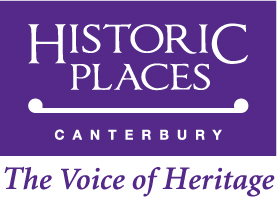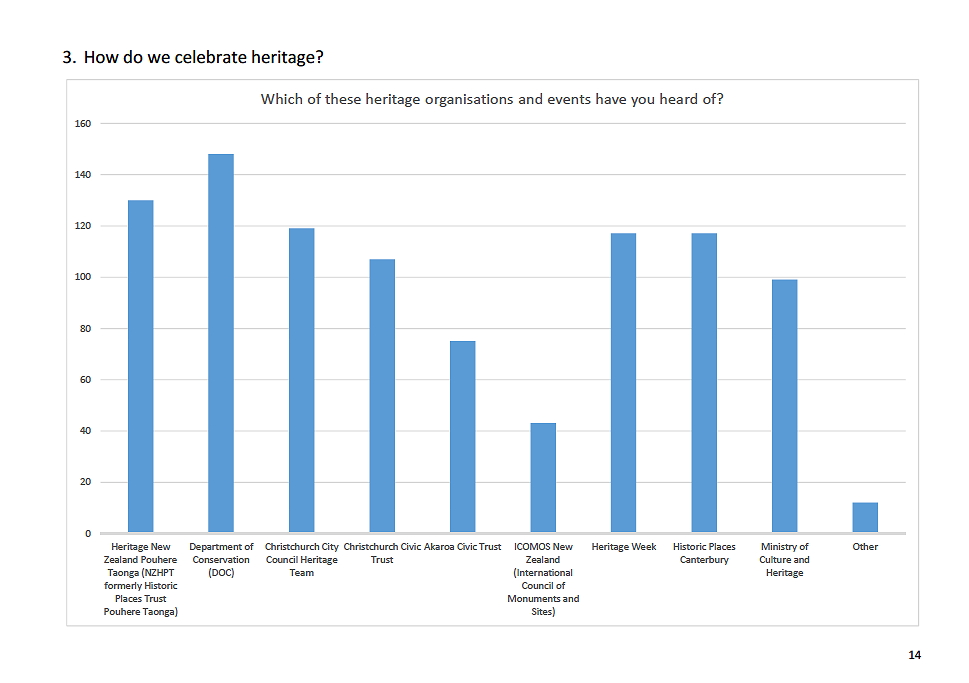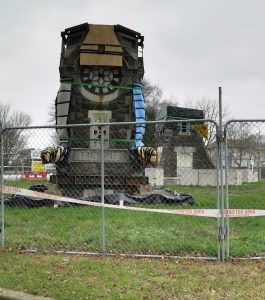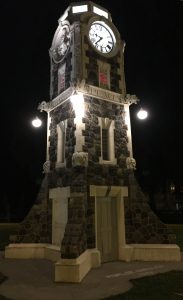
Christchurch City Council Draft Heritage Strategy 2019-2029
Submission from Historic Places Canterbury.
The Process of Consultation and Formulation of the Draft Heritage Strategy:
Historic Places Canterbury (HPC) wishes to commend the Christchurch City Council Heritage Team for its efforts in Community Consultation, developing and delivering this Draft Heritage Strategy (Strategy). The Heritage Teams leadership has benefitted the process thus far and HPC considers it essential that they continue to lead in all subsequent work related and resulting from the Strategy.
Secondly Historic Places Canterbury formally knowledges the actions of the Christchurch City Councillors who adopted the Heritage Team’s recommendation of starting this process by right at the beginning asking the residents, groups and Communities of Christchurch what they wanted in the Christchurch City Council Heritage Strategy and then developing the draft strategy driven by the Residents, groups and Communities responses. In addition, the CCC Heritage Team sought feedback in the process of formulating the Draft Heritage Strategy.
Historic Places Canterbury was pleased to learn that the Mayor and Councillors individually involved themselves in the workshops and events that were used to develop this Draft Heritage Strategy.
Historic Places Canterbury considers the process and philosophy used for the Draft Heritage Heritage Strategy adopted by the Heritage Team and the Christchurch City Council (CCC) as one that should be used as a Council Template for future Consultations especially concerning Heritage.
Historic Places Canterbury requests the Christchurch City Council share these processes and experiences with other Territorial Authorities as we consider they and heritage will benefit from this approach of consultation and this process of strategy formulation becoming more widespread.
General Overall Comment on Draft Heritage Strategy:
Historic Places Canterbury is in agreement with the Strategy and our comments are mainly suggestions of refinement. HPC considers it is an important to consolidate and recognise the many informal relationships as well as establish new ones with the Communities that make up Christchurch and the Banks Peninsula. HPC fully endorses this approach.
Historic Places Canterbury considers the partnership, participation, role and acknowledgement of the Papatipu Rūnanga as being essential and long overdue.
Historic Place Canterbury is supportive of the Draft Heritage Strategy’s recognition and inclusion of the heritage of those who are not part of the traditional European heritage and again we consider this long overdue.
Historic Places Canterbury notes the extensive use of the work “community” in the text of the Strategy. HPC requests “community” should be substituted with the word “Communities” or something similar in meaning. HPC notes the phrase “communities of Christchurch and Banks Peninsula” (p16 of the Draft Heritage Strategy) sums up the intention of the documents.
The Strategy uses the phrase “partnership with six papatipu rūnanga” to define its relationship.
For the Community/Communities it uses the word “collaboration” and “together with the community” within the Strategy.
HPC requests the CCC reconsider the relationships (as defined in the Strategy) with the Communities and change it to one of Partnership or Collaboration as appropriate?
The Strategy mentions a “Charter” which effectively quantifies the CCC heritage relationship with the Communities.
(HPC notes the terms and conditions for those who take part in Heritage Week could be described as partnership agreements.) Defining relationships clearly also means there is less chance of a misunderstanding.
Historic Places Canterbury considers the Draft Heritage Strategy needs more development in dealing with our digital heritage future which is already here and will continue to exert a growing and significant presence. The CCC has put online the Scheduled Heritage Building’s own Statements of Significance but what is its Strategy when it comes to its own history and the social history of the buildings it has within its custody?(At one stage an oral history project recording the experiences of those who worked in the Canterbury Provincial Chambers was being discussed.)
Historic Places Canterbury would like the Strategy to give an indication of the variety of roles CCC envisages it will be providing in supporting the Communities of Christchurch and Banks Peninsula in their attempts to record and promote their heritage.
HPC notes the Library has a digital archive along with the Canterbury Museum’s collection and similar organisations such as Wigram and Akaroa, the Hall of Flame at Ferrymead etc and the University of Canterbury and the Strategy needs to look at the relationships the CCC has with these. What are the Community Board’s role within their local area? How is their local history and objects to be recorded or kept?
The Strategy correctly identifies the importance of intangible heritage as it relates to the stories of a heritage building. Questions will then be asked, for example, will the Library have a role in facilitating or storing those oral histories?
Historic Places Canterbury notes that a workshop participant commented the Strategy has the potential to be a part of the core of the CCC in its functions. HPC submits the Strategy provides an opportunity for the CCC to lead by example in demonstrating the importance of our City’s and Banks Peninsula’s heritage.
The Strategy commits the Christchurch City Council to be an active Heritage participant as evidenced by the word’s “collaboration” and “partnership”.
Historic Places Canterbury fully endorses this approach.
Such an approach will necessitate a cultural change within sections of the Bureaucracy especially as it will require a change to the traditional bureaucratic top down decision making management style which will at minimum have to be more open and communicative. HPC considers the Councillors will have to lead by example as they have thus far in this process.
Historic Places Canterbury is aware of the work published, such as by Building Economist Donovan Rypkema which conclusively provides evidence of the positive economic contribution of Heritage Buildings (and their retention). (These economic benefits are not just confined to Tourism.)
The Strategy, HPC requests should have additional text that states that the CCC understands and accepts the Economic Value of Heritage Buildings, the value of their active retention and the positive economic effects i.e. revitalization, restoration benefits etc they have on the local economy.
Specific Strategy Comments:
Whāinga Goals (p34)
Historic Places Canterbury requests an additional Whāinga be added, that the CCC will commit to updating and regularly add heritage buildings and sites to its District Plan Heritage Schedule.
HPC understands that between 1996 and recent Independent Hearing Panel there were little or no Christchurch Heritage Buildings Scheduled. It is important to acknowledge the importance of heritage however the CCC needs to actually commit itself to fulfilling its RMA Duties in its own Heritage Strategy.
Historic Places Canterbury requests the Strategy state that it will be adopted as binding by the Council as a whole.
HPC understands that the Urban Design Panel approved plans for the proposed demolition of the Harley Chambers, a scheduled heritage building. Whilst HPC does not wish to curb the independence of the Urban Design Panel it is not unreasonable that the Strategy be respected and acknowledged by such organisations and only in exceptional circumstances should the Strategy be ignored.
Mahinga Actions
Whāinga Goal 1. (page 35) …
“4. Celebrate and promote the Council’s role as heritage champion…
- Celebrate how the Council models best practice asset management ..”
Historic Places Canterbury requests that an addition be made to this section that the CCC will commit to share its knowledge and experience of heritage management best practice.
The Council has extensive experience knowledge in all aspects of heritage building management i.e. procurement, project management, budget, engaging professionals and HPC considers a practical Strategy is to commit to sharing its knowledge and experience with Heritage Building Owners and other Territorial Authorities.
Historic Places Canterbury requests that Whāinga Goal 1 contain a paraphrase of Whāinga Goal 2 section 4.
HPC proposes that “The Council …” add the following;
Raise awareness of Our Heritage, Our Taonga across all Council Departments.
Whāinga Goal 2
Historic Places Canterbury fully endorses Whāinga Goal 2.
Whāinga Goal 3
Historic Places Canterbury fully endorses Whāinga Goal 3.
Historic Places Canterbury requests further consideration be given to this goal and the responsibility that will need to taken on by the Community Boards.
For example HPC notes that Crown Glass used to be a prominent industry in Hornby with artisans living close by. HPC considers the Strategy should enable the local Community Board to participate in celebrating and preserving its own unique community heritage.
Whāinga Goal 4
Historic Places Canterbury requests that under
(Section) “4 Support owners of heritage building through; …. ”
Historic Places Canterbury request that an addition be made to this section of the Strategy. The CCC work on a standard or accredited list of approved suppliers of Heritage Plaques for owners of Heritage Buildings. These plaques would publicly identify that the building is a historic building.
Historic Places Canterbury’s federated national body Historic Places Aotearoa has recently launched a nationally available Heritage “Blue” Plaque project (inspired by the UK Blue Plaque) which allows a building to be identified as heritage. Such a project is an ideal candidate for accreditation as well as being part of an emerging national standard.
Whakatinanatanga Implementation (p42)
“Implementation of this strategy depends upon partnership and collaboration.”
Historic Places Canterbury fully endorses this approach.
As noted above HPC requests the CCC reconsider and describe the relationships in the Strategy with its Communities as one of Partnership and or Collaboration.
HPC considers the Heritage Charter to be an excellent initiative and is looking forward to hearing the Communities heritage voices.
HPC requests as part of the Whakatinanatanga that consideration be given to setting up a Forum and or Reference Group that would meet on a regular basis.
As well as enabling the CCC to receive feedback it will have the additional advantage of allowing the sharing and exchanging of views. The CCC could use this to facilitate the sharing and understanding of views from the Papatipu Rūnanga and the wider Communities.
We wish to heard by the Hearing Panel.
Mark Gerrard
Chair Historic Places Canterbury
021157 5043
















